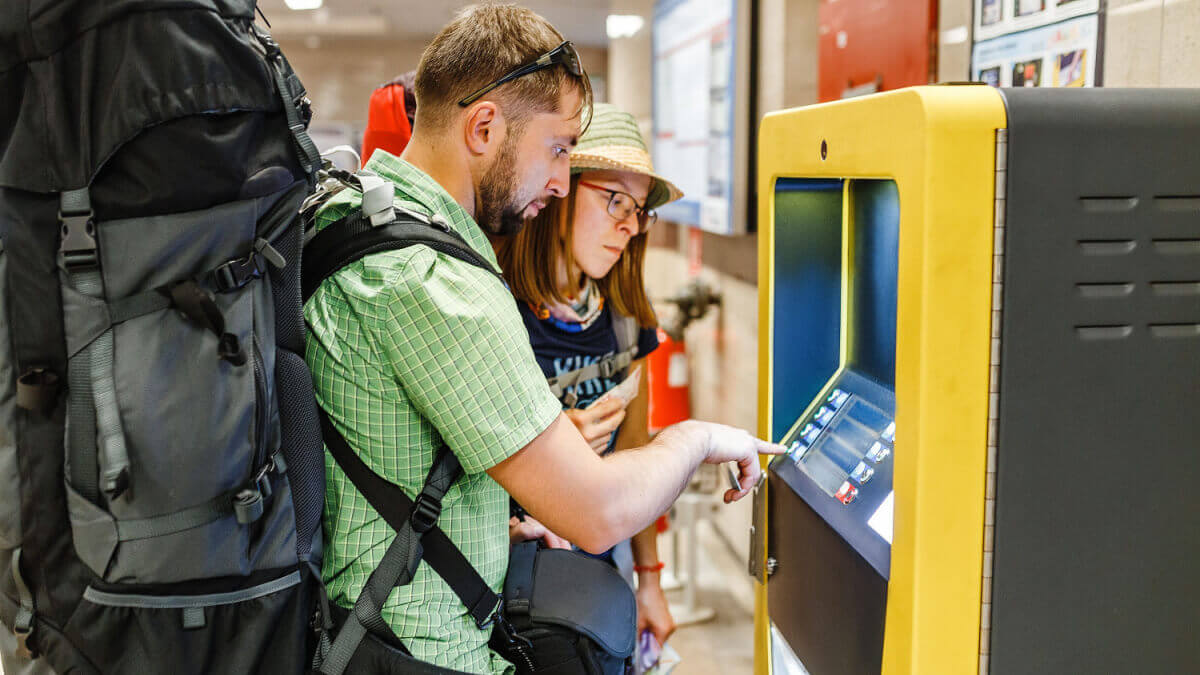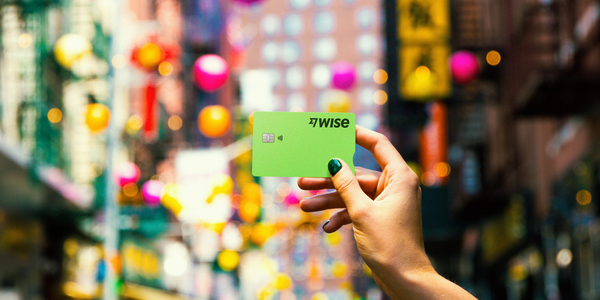American Airlines first class vs business class – Comparison
Read our comparison of American Airlines first class vs. business class on cost, dining, in-flight service, lounge access and more.

Heading off on holiday? Whether it’s a summer holiday in France, road trip in the USA or a month-long trek across Thailand, you’ll need to get your spending money sorted.
But what is the best way to spend money abroad? The most important factor is bound to be cost, working out how much you’ll need to pay in commission fees and the impact of exchange rates. There’s also convenience to consider, as well as security.
In this helpful guide, we’ve put together a rundown of all the best ways to spend overseas. This includes cash, debit cards, credit cards and more, with pros, cons and tips on the best options to choose.
We’ll also show you how dedicated travel cards like the Wise card could save you money during your trip.
| Table of contents |
|---|
In the past, a trip to the local Bureau de Change to buy currency was an essential part of getting ready for a holiday. It’s not the case anymore, as debit and credit cards have become a more popular way to spend overseas (more on those options later).
However, some people prefer to spend in cash when they’re in a foreign country. It can be easier to keep track of spending, which is essential if you’re travelling on a budget. You also don’t need to worry about finding a cash machine for vendors that don’t accept cards. If you buy in advance, you’ll have all the spending money you need from the moment you land.
There’s also the benefit of avoiding hidden fees and knowing exactly how much your currency purchase cost. You can compare exchange rates and commission fees before you travel, and purchase at the right time to get a good deal.
But there are of course downsides to spending in cash on holiday. It’s far from the safest way to spend money abroad, as there’s always the chance it could be lost or stolen. Not everywhere will accept cash either, as more and more places (especially in Europe) are going cash-free.
It’s also unlikely that you’ll get the best exchange rates when purchasing foreign currency, compared to using a dedicated travel card. Commission fees can be high too, especially when exchanging money at airports and hotels - this is to be avoided if possible, as it can make it very expensive to get hold of spending money.
A more convenient way to spend while overseas is by debit card. All you need is one small piece of plastic, and you can spend and withdraw cash whenever you need to. There are even prepaid travel debit cards out there, which you load up with money before you travel. These can help you keep an eye on spending during your trip.
| 📚 Read more: 7 best UK-issued prepaid travel cards for Europe |
|---|
However, there is one very important thing to remember - not all debit cards are travel-friendly. The debit card that comes with your UK bank account may have high fees for using it outside of the UK. The fee will usually be described as a ‘non-Sterling transaction fee’ and will apply to both card payments and ATM withdrawals.
But there are some cards that don’t charge these fees. Here’s a quick look at a couple of the best debit cards for spending abroad:
| Provider | Spending overseas | ATM withdrawals overseas | Features |
|---|---|---|---|
| Chase debit card | No fee | - No fee - £500/day limit | 1% cashback on spending for a year |
| First Direct debit card | No fee | - No fee - £500/day limit | Account comes with linked saver account |
To get your hands on either of these travel-friendly debit cards, you’ll first need to open a current account with the provider.
This can be a bit of a hassle, and takes some time for the paperwork, online banking login details and the card itself to be posted out to you. It’s no good if you’re due to fly in a few days' time.
A better alternative could be with an online account like Wise, which offers an international debit card for a one-time fee of just £7 or get the Wise digital card for free. This card is tailor-made for travel, letting you spend and withdraw cash like a local in 150+ countries.

One of the cheapest ways of spending money abroad is a travel credit card. Like with debit cards, you can’t just take any old credit card with you. Some will have non-Sterling transaction fees, as well as a hefty charge for taking cash out at an overseas ATM.
What you’ll need is a specialist credit card, one designed for travel. These cards don’t have fees for spending overseas, and they give you an exchange rate close to the mid-market rate. Some even offer perks such as cashback, air miles or other travel-related rewards.
However, you’ll need to pass a credit check to get a credit card, and you’ll also need to make sure you can pay back whatever you spend. One thing that’s worth remembering is that although many travel credit cards don’t charge fees for cash withdrawals, some will start charging interest from the moment you take the money out.
Here are a couple of the top travel credit cards available right now:
| Provider | Spending overseas | ATM withdrawals overseas | Interest rate | Features |
|---|---|---|---|---|
| Barclaycard Rewards Visa | No fees | - No fees - No interest on cash withdrawals if repaid in full | 28.9% APR representative | 0.25% cashback on most spending |
| Halifax Clarity Mastercard | No fees | - No fees - 23.94% to 28.94% interest, charged daily until repaid | 22.9% APR representative | N/A |
| 📚 Read more: Best Credit Cards in the UK - Fees, Rates, Rewards and More |
|---|
While you’re busy booking flights and packing your suitcase, you’ll also need to get travel spending sorted. Here’s a quick checklist of things to look out for:
If you’re after margin-free exchange rates, low fees and a cash-free solution for your holiday spending, check out the Wise card from the money services provider Wise.
The Wise card is a contactless international debit card, which can be used in 150+ countries worldwide. It works everywhere from shops and restaurants to transport hubs and hotels.
When you spend, the card automatically converts your pounds to the local currency at the mid-market exchange rate. There are no margins or markups, only a small currency conversion fee. And if you already have the currency in your Wise account, there’s no charge.
Need cash? No problem. The Wise card lets you withdraw up to £200 a month (2 or less withdrawals) with no fee*.
Although you’ll need to watch out that overseas ATM operators don’t charge their own fee.
Open a Wise account online and you can get a Wise card for a one-time cost of just " or get the Wise digital card for free, with no subscription fees*.
Sources used for this article:
Sources checked on 01-Feb-2024.
*Please see terms of use and product availability for your region or visit Wise fees and pricing for the most up to date pricing and fee information.
This publication is provided for general information purposes and does not constitute legal, tax or other professional advice from Wise Payments Limited or its subsidiaries and its affiliates, and it is not intended as a substitute for obtaining advice from a financial advisor or any other professional.
We make no representations, warranties or guarantees, whether expressed or implied, that the content in the publication is accurate, complete or up to date.

Read our comparison of American Airlines first class vs. business class on cost, dining, in-flight service, lounge access and more.

Read our comparison of Air India business class vs. first class on cost, dining, in-flight service, lounge access and more.

Read our comparison of Qatar Airways first class vs. business class on cost, dining, in-flight service, lounge access and more.

Read our handy guide on how to cancel an Emirates flight, including refunds, cancellation fees and the airline’s cancellation policies.

Read our handy guide on how to cancel a Virgin Atlantic flight, including refunds, cancellation fees and the airline’s cancellation policies.

Read our handy guide on how to cancel a Qatar Airways flight, including refunds, cancellation fees and the airline’s cancellation policies.